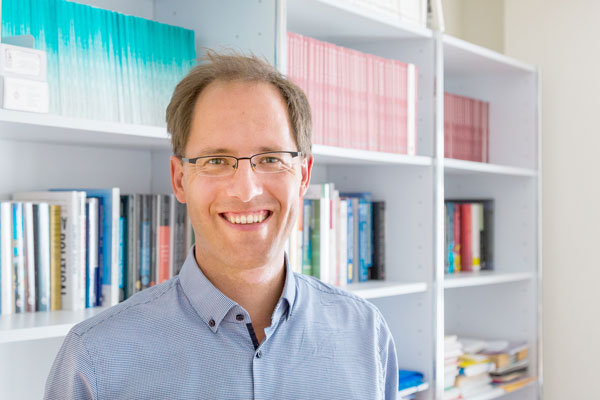
Florian Scheuer explores whether top salaries are of benefit to the poorest
Higher taxation of top salaries that hardly create any social values and of robots that destroy jobs? Florian Scheuer, Professor of Economics of Institutions at the University of Zurich, assesses novel tax systems in an ERC project to control the growing inequality of income.
His career path was influenced by two events: the financial crisis in the years 2007 and 2008 and the time when the tissue of lies of New York’s financier Bernard L. Madoff was busted. In those days, Florian Scheuer was basically at the source of the blaze. Between 2005 and 2010, he conducted tax policy research at the Massachusetts Institute of Technology (MIT) in Boston. MIT economists were little worried about the financial crisis at that time. «We believed that the Federal Reserve Bank could solve the problems of the banks concerned with a few technical interventions,» the 38-year-old Professor of Economics recalls the general atmosphere at the MIT ten years ago. Neither the established economy professors nor their students could possibly imagine that the collapse of the first financial institutes would be the initial domino to fall, knocking down within only a few months the state finances of numerous countries and the real economy and leading to severe unemployment and a fall in GDP in many countries. «Back then, economists were convinced that they had essentially solved the question of how to ensure stability.» However, reality proved them wrong. They had to realise that their models did not work, that they had thought themselves safe when they were not. «This came as a shock for many of our teachers,» Scheuer remembers. For the young MIT students, in contrast, the financial crisis triggered a burst of energy. «We knew that novel approaches were needed – we knew that we were needed now.»
A question of justice
In late 2008, the German PhD candidate also followed with great interest the collapse of Bernie Madoff’s Ponzi scheme. Said financier had set up an investment firm, promised continuous great returns to his investors, yet never invested their money. His former investors were paid by returns from the new deposits. Madoff’s system crashed as part of the financial crisis. More than 4,800 people from over 20 countries lost their money; millionaires, foundations, workers who had put their entire pension funds in the Madoff scheme. It was the first huge global fraud case. Madoff received more than a life sentence: 150 years in prison. «The severity of the penalty shows the immense damage he’s caused,» Scheuer says.
«We knew that novel
approaches were needed –
we knew that we were
needed now.»
Scheuer grew up in the Black Forest region, the son of teacher parents. He’s been fascinated by questions of justice and equality ever since his adolescence. Already as a student at the gymnasium he contemplated the future of social insurance in view of the demographic development or the unemployment rate triggered by automation. He decided to study economics because he wanted to understand economic and political relations and find solutions for the social problems caused by economic activities. «Many concerns that society has to deal with can be traced back to economic problems,» Florian Scheuer states.
What are the social values that a top manager creates?
The economy does not act for itself but for society as a whole. This was already pointed out in the 18th century by the Scottish moral philosopher, enlightener and economist Adam Smith. The father of modern free trade stated that it was the economy’s duty to enhance the welfare of society, therefore of all people. The Madoff case as well as the «astronomically» high income of top executives, which have increased «drastically» in many countries over the last three decades, prompted Florian Scheuer to ponder on novel tax models. First, the economist asked about the benefit of these top incomes for society as a whole and about the values they created for society. Scheuer perceives himself in the tradition of John Rawls, an American liberal justice theorist whose principals of social justice were guided by the least advantaged members of society. One of his principles correspondingly states that social and economic inequalities are only justified if the least advantaged receive the greatest benefit. Or, in other words: The prosperity of the poorest must increase visibly once the rich people get richer. Scheuer is now analysing which high incomes serve social welfare and which ones are to the disadvantage of many. Surveys in the United States, for example, indicate that some high-paid investment bankers hardly create any social value at all. They are strongly overpaid.
«Surveys in the United States indicate
that some high-paid investment bankers
hardly create any social value at all.
They are strongly overpaid.»
Good kindergarten teachers, by contrast, are massively underpaid; measured against the social value they create, they should be paid about 300,000 dollars a year.
ERC project: Development of fair tax models
Scheuer reflects upon tax systems that not only help to rectify such injustices but that create incentives in the long run so that future (university) graduates will increasingly consider professions that create social values: that is, for example, that there will be more young teachers than investment bankers.
To help reduce the growing inequality by means of fiscal policy is a matter very close to the heart of the calm and considerate economist. For this, Scheuer – who moved from the prestigious Stanford University to the University of Zurich in 2017 as a «UBS Professor of Economics of Institutions» – received a Starting Grant of the European Research Council (ERC). ERC Starting Grants promote promising young scientists. The altered conditions of the employment market are in the foreground of the ERC project that started at the beginning of this year and will span a course of five years, funded with one million euros. Scheuer explains that most tax systems try to reduce income inequality by means of redistribution. He plans to address the income directly and measure the amount of taxation by the social value of the professional activity.
Scheuer approaches inequalitiy from three different angles. First, together with his team, he analyses how high incomes come about in the first place, whether they for instance enhance both the personal and the social prosperity. In obvious cases, if income is achieved at other people’s expense – as is often the case in the financial sector – then it is time for a change, according to Scheuer. This injustice can be rectified by imposing a considerably higher tax on these incomes.
Robot tax
The second focus of the project is on the increasing automation and globalisation, which elevate capital incomes but destroy jobs, namely those of the so-called middle class. Once these jobs disappear, there is a massive drop in tax revenue. Making the necessary adjustments for such great changes takes time, often two generations. Scheuer examines whether a kind of «robot tax» could serve as a useful transitional instrument, «to guide us through the period of adaptation.» Robots would be taxed higher than other forms of capital, which would slightly slow down automation and cushion its negative consequences. Scheuer, however, does not consider this tax to be a durable solution as it may hinder technological developments. South Korea, market leader in many areas of technology, has recently introduced such an approach.
The third emphasis is on how inequality is passed on to the next generations and how equal opportunities can be prompted by means of tax money, for example by increased funding of education and training or a basic income. Personally, he does not believe that a basic income can solve the problems. «People want jobs, no transfer benefits,» he states.
«We can try to direct the greed for profit
into the right channels,
so that ultimately it creates
something good.»
Several studies have shown that work itself contributes far more to people’s life satisfaction than government transfers, as it gives them structure, recognition and prestige as well. In Scheuer’s view, however, education and training are the main tools people need to be able to adapt to these dynamic changes, especially so in times when most cannot bank on life-long positions and technological developments destroy jobs. «We must invest in education to achieve equal opportunities,» Scheuer is convinced. Finally, the team wants to show with this project how wealth inequality and political influence are interrelated.
Back when Scheuer applied for an ERC Starting Grant, he was still an Assistant Professor at Stanford University. «When we learned that we would have twins, we decided to move back to Europe,» Scheuer recounts. In Zurich, the economist was able to start his professorship with the ERC project ready. He is glad about the financial support by the EU, as it permits him to tackle a long-desired research project and, additionally, hire the specialists needed for it. He already employs a postdoc dealing with robot taxes; a second postdoc position is planned for this year. «Without the ERC, this would not be possible.»
Any lessons learnt from the financial crisis?
Did the economy learn from those events? Scheuer says that the financial crisis had a great effect on scientific research. He also believes that economists have become somewhat more humble: «They no longer believe to have everything under control.» He does not dare to evaluate whether the real economy and politicians have learnt from the financial crisis; yet, he has his doubts. Matter-of-factly, he establishes that at least in the USA many government regulations have been repealed since Trump’s accession to office.
During the past ten years, the term «greed for profit» was the noun most often used by the media when describing top managers. Florian Scheuer does not count on more modesty. «People will always want to see what’s in it for them.» Trying to teach them more morality, in Scheuer’s opinion, is not a fruitful path to follow. «But we can try to direct this greed for profit into the right channels, so that ultimately it creates something good.» Adam Smith believed that the government did not need to overly intervene in economic actions, that an «invisible hand» would guide everyone towards greater prosperity. Smith was wrong. According to Scheuer, studies prove that it is precisely the laissez-faire economic policies that lead to injustices. The government must intervene again more effectively in a corrective and regulative manner. More state intervention as opposed to even more deregulation. Has this realisation already been understood? Scheuer says that increased government involvement is beyond debate in today’s economic world. «We will see whether politics will take these new findings seriously and implement them. At any rate, banks and companies that gained from the deregulations during the past decades will certainly invest greatly in lobbying.»
Interview with Florian Scheuer
Florian Scheuer
Florian Scheuer is Professor of Economics of Institutions at the University of Zurich, endowed by the UBS International Center of Economics in Society. He was previously Assistant Professor of Economics at Stanford University, a Visiting Professor at Harvard University and UC Berkeley, and a National Fellow at the Hoover Institution. He holds a PhD in Economics from MIT. Scheuer's research connects the fields of public finance, economic theory, macroeconomics and political economy. In particular, he has studied how rising inequality affects various aspects of optimal tax policy and vice versa. His work has been published in the American Economic Review, the Journal of Political Economy, the Quarterly Journal of Economics and the Review of Economic Studies, among other journals. In 2017, he was awarded an ERC Starting Grant for his project «Inequality – Public Policy and Political Economy.»
ERC Starting Grant
«IneqPol: Inequality – Public Policy and Political Economy»,
Duration: 2018-2023
Financial contribution from H2020: 1,008,665 €




